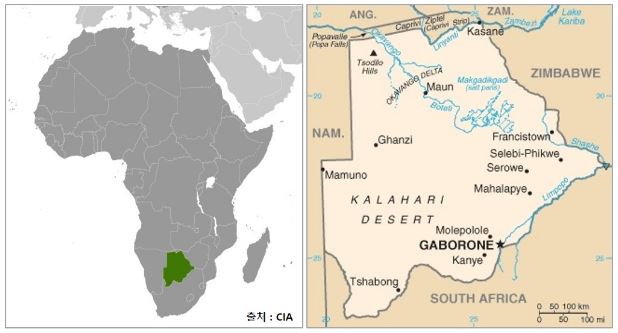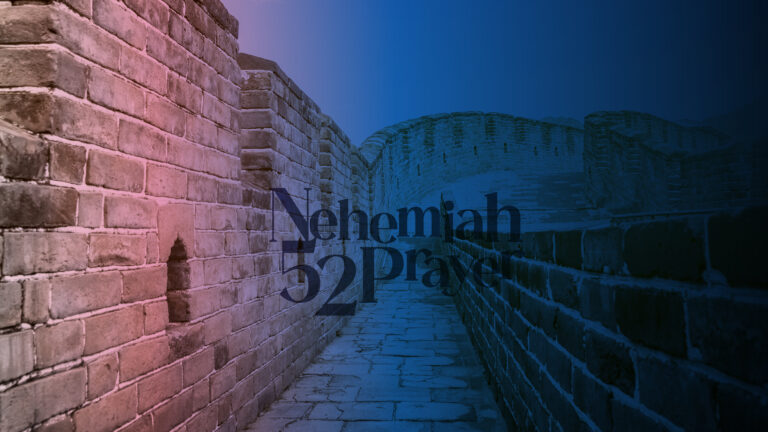“Botswana, seek the LORD more than gold, and find life!”
I love those who love me, and those who seek me find me. (Proverbs 8:17,NIV)

》 Country Profile
Continent | Africa
Population | 2.71 million
Area | 581,730㎢, 80% of the country is covered by the Kalahari Desert
Capital City | Gaborone (270,000 people)
People Groups | Total 46 Groups, Tswana 53%, Setswana 19.1%, Kalanga 6.5%, Kgalagadi 3%, Shona 2.4%, Yei 2.3%
Official Language(s) | English, Tswana
Total Languages | 36
Bible Translations | Completed 15, New Testament 5, Partial 7
Religion | Christianity 65.5% (Independent church 37%, Protestant 11%), Ethnic religion 33.3% Evangelical 8.3% (200,000 people)
》 About Botswana
Botswana‘s Tswana people belong to the Sotho branch of the Bantu ethnic group and migrated to the region around the 17th century. European exploration began in 1801, and the London Missionary Society commenced its activities in 1813. The area then experienced a series of conflicts, including the expansion of the Zulu Kingdom, the invasion of the Ndebele people (a Zulu offshoot), and the migration of Boer settlers from the Cape Colony starting around 1835. The British also resisted Boer incursions in the region.
In 1885, three tribal chiefs, determined to prevent Botswana’s incorporation into Zimbabwe or the Union of South Africa, traveled to Britain and successfully lobbied the British government to place Bechuanaland under its protection. The territory became a British colony in 1895 and later gained independence in 1966 under the name Botswana. For over 50 years, Botswana has maintained civilian rule, implementing progressive social policies and substantial capital investments, making it one of Africa’s most stable democracies. However, the country faces a severe HIV/AIDS crisis, with an adult infection rate of 19.9%, the third highest in the world. Botswana follows a presidential system, and Duma Gideon Boko has been serving as president since November 2024.
Since gaining independence in 1966, Botswana maintained one of the highest economic growth rates in Africa until the 2008 global financial crisis. The economy is primarily driven by mining and exporting minerals, including diamonds, which account for the third-largest reserves in the world, as well as red nickel and other minerals. Tourism is also a rapidly growing sector, contributing significantly to economic development. Most residents engage in livestock farming and agriculture within designated tribal lands, but many also work as laborers on European-owned farms. The country has made remarkable progress due to strong financial management, fiscal discipline, and the integrity of its leadership. However, unemployment remains a critical issue, particularly among youth, where the rate exceeds 46%.
Botswana’s GDP per capita is approximately $7,695.
》 Scripture Focus
| Proverbs 8:10-11, 17-19, 35(NIV) 10 Choose my instruction instead of silver, knowledge rather than choice gold, 11 for wisdom is more precious than rubies, and nothing you desire can compare with her. 17 I love those who love me, and those who seek me find me. 18 With me are riches and honor, enduring wealth and prosperity. 19 My fruit is better than fine gold; what I yield surpasses choice silver. 35 For those who find me find life and receive favor from the LORD. |
》 Prayer Points
1. Botswana was the first region in Africa to respond to the gospel when the London Missionary Society preached to the Tswana people in 1813. Today, over 65% of the population identifies as Christian, with the Africa Initiated Churches (AIC)—also known as the Holy Spirit Church—being the largest religious group, comprising 37% of the population. In recent years, Pentecostal churches have experienced rapid growth in both numbers and size, though this growth has now slowed. However, Christianity in Botswana is often intertwined with animistic beliefs and nominal faith. Many large independent churches focus on problem-solving, wish fulfillment, and healing, often incorporating syncretistic and non-biblical practices. This spiritual condition is reflected in the moral struggles within the church: pastors and believers alike often live immoral lives, alcoholism is widespread, and sexual corruption has led to the collapse of traditional family structures, contributing to a high rate of illegitimate births.
Let us pray for the pastors, church leaders, and nominal believers in Botswana to honestly examine their lives in light of the truth and receive discipline. May God stir within them a deep thirst for the true gospel—one that transforms lives and is more precious than silver or gold—so that they may be reborn as a holy people.
2. We give thanks that the Botswana church has actively engaged in partnerships with mission organizations, working together in various cooperative ministries. The Botswana Evangelical Coalition, the Botswana Council of Churches, and the Organization of Independent Churches in Africa (OAIC) have collaborated on significant joint projects. The Joining Hands mission network has helped many ministries strengthen their outreach through initiatives like the Micah Challenge. Additionally, numerous Christian organizations have worked alongside the government on long-term initiatives such as Vision 2016, ensuring that biblical principles are applied in health, economic, and social programs alongside evangelism and church planting efforts. AIDS remains the leading cause of death in Botswana, with the third-highest infection rate in the world. There are hundreds of thousands of AIDS orphans, and life expectancy has decreased by 30 years due to the disease.
Let us pray for the ministries working with AIDS victims, orphans, and the next generation—that they would be strengthened through the gospel and prayer. May Botswana proclaim that true life is found only in Jesus Christ, and may the nation receive the grace of the LORD, turning the crisis of death into an opportunity to embrace the fullness of the gospel of the cross.
3. Botswana’s youth make up 49% of the population, making youth and young adult ministry crucial. However, young people face serious challenges such as high teenage pregnancy rates, unemployment, and the ongoing impact of AIDS. Ministries such as Scripture Union (SU), the International Fellowship of Evangelical Students (IFES), Youth with a Mission (YWAM), and Open Baptist Church are helping youth grow spiritually and develop life skills, including AIDS prevention and discipleship training. The Kalanga people, with a population of 152,000, have AIC and Pentecostal churches, yet only about 2% are evangelized. The Yei people, numbering 54,000, remain deeply connected to traditional ethnic religions. Mission organizations such as the Botswana Loving Mission Association, Word to Africa, and Calvary Ministries are actively reaching them with the gospel. Likewise, the Nambia, Mbukusi, and Herero peoples are still in need of the good news of Jesus Christ.
Let us pray for Botswana’s next generation and the unreached people groups, asking that they be transformed by the gospel. The San people (Bushmen) are nomadic desert dwellers, yet their way of life has been threatened by the expansion of tourism and livestock industries, pushing many into poverty and vulnerability. They are also at risk of human trafficking. Let us pray that the chains of oppression, exploitation, and human trafficking among the San people will be broken. May they find true freedom in Christ and experience restoration and dignity in His name.
》 Urgent prayer requests around the world need your prayer!





